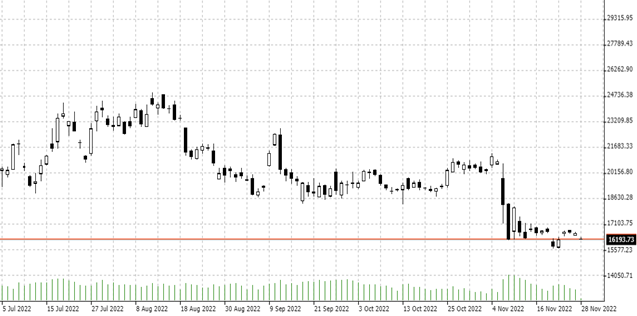

28.11.2022 – After the FTX debacle, the entire crypto industry is being shaken up. But will we soon see a resurgence after the crash? We let experts have their say.
The daily chart of BTCUSD currently looks rather depressing from the bulls’ point of view. But what will happen next?

Source: Bernstein Bank GmbH
Kenneth Rogoff, former chief economist at the International Monetary Fund and now a professor at Harvard, just judged that the collapse of Sam Bankman-Fried’s $32 billion crypto empire FTX will go down in history as one of the greatest financial debacles.
Not the last scandal
The loss of confidence will, of course, result in a continued plunge in the price of the underlying, especially if regulators now turn their attention to the various exchanges in a more stringent manner. However, a price adjustment is not the end of the world. The most likely case would be better regulation of centralized trading venues. Which, in turn, could restore confidence and result in higher crypto prices. Still, the bottom line for Rogoff is that FTX won’t be the last scandal.
“Bitcoin is not going away”
Star investor Mike Novogratz spread hope on CNBC: “We certainly do have a crisis of confidence in the industry and we’re not out of the woods yet. FTX was a major player so it’s going to take a few weeks for people to even get their balance back. Bitcoin’s not going away.” However, he predicted a long, rocky road ahead for the market, saying, “I don’t think it’s going to be a ‘V’ recovery, it’s going to be a grind out of gaining trust.”
“There will be pain”
Meanwhile, Binance CEO Changpeng “CZ” Zhao gave details of his planned crypto rescue fund. He said he wants to raise at least $1 billion, and the fund could also grow to $2 billion; its mission: “to help projects who are otherwise strong, but in a liquidity crisis.” And further, he explained recently on the sidelines of Abu Dhabi Finance Week, “There are still players with very strong financials and we should band together to try to help the projects in need, especially if it’s only financial need.” And to Bloomberg, CZ said, “There will be pain whenever one player goes down.”
Our conclusion from all this: apparently, key industry figures see a possible learning effect and a restoration of confidence if workable regulation is put in place. But the way out of the deep valley is likely to take time. We are curious to see what happens next – and wish you successful trades and investments!
__________________________________________________________________________________________
The content of this publication is for general information purposes only. In this context, it is neither an individual investment recommendation or advice nor an offer to purchase or sell securities or other financial products. The content in question and all the information contained therein do not in any way replace individual investor- or investment-oriented advice. No reliable forecast or indication for the future is possible with respect to any presentation or information on the present or past performance of the relevant underlying assets. All information and data presented in this publication are based on reliable sources. However, Bernstein Bank does not guarantee that the information and data contained in this publication is up-to-date, correct and complete. Securities traded on the financial markets are subject to price fluctuations. A contract for difference (CFD) is also a financial instrument with leverage effect. Against this backdrop, CFD trading involves a high risk up to the point of total loss and may not be suitable for all investors. Therefore, make sure that you have fully understood all the correlating risks. If necessary, ask for independent advice. CFDs are complex instruments and are associated with the high risk of losing money quickly because of the leverage effect. 68% of retail investor accounts lose money trading CFD with this provider. You should consider whether you understand how CFD work and whether you can afford to take the high risk of losing your money.7
